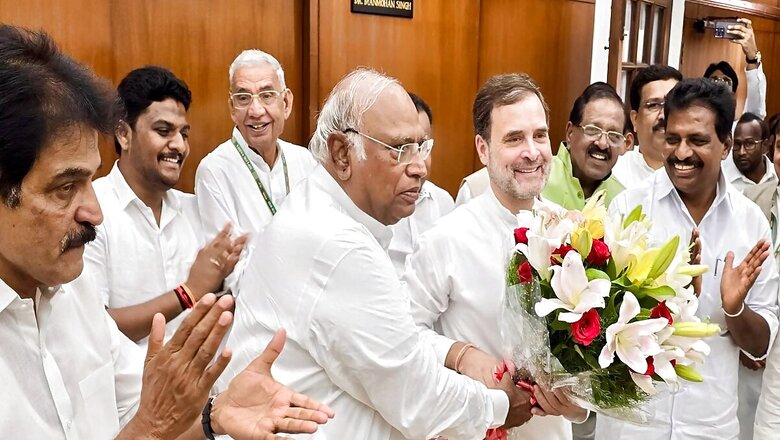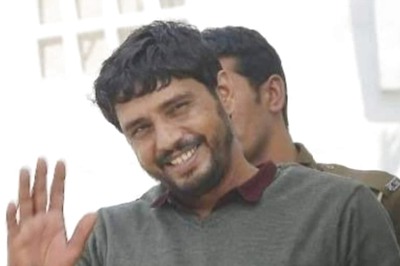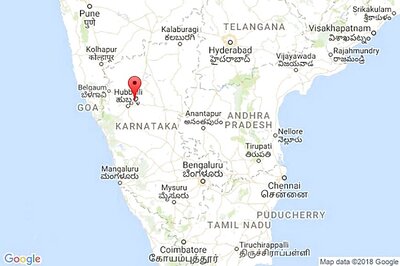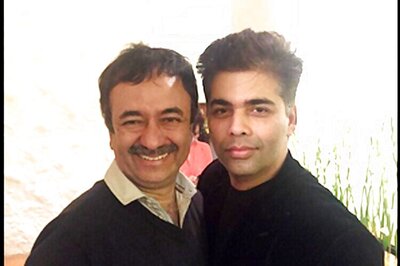
views
The curtains have drawn on the Lok Sabha elections, and India’s political theatre is abuzz with unexpected twists. The Opposition, a mosaic of regional aspirations and national ambitions, has outperformed expectations, signalling a shift in the political winds. The Bharatiya Janata Party (BJP), steering the National Democratic Alliance (NDA) has secured victory, albeit with a performance that fell short of its benchmark. The NDA clinched 292 seats, with the BJP contributing 240 to the tally. In contrast, the Indian National Developmental Inclusive Alliance (INDIA), a coalition of Opposition parties, made a significant dent with 233 seats.
This election was not just a numerical battle but a test of narratives and alliances. The INDIA bloc, despite not fighting the election as a monolithic entity, has claimed the results as a mandate for their collective ideology. However, the reality is nuanced, as the alliance did not contest the elections under a unified banner nationwide. With the first session of Parliament now two days in, the real work for both the ruling party and the Opposition is just beginning. All eyes are on the Opposition to see if their unified front will hold. Will they present a strong challenge to the ruling party, or will the pressures of parliamentary debate expose cracks in their alliance?
Moreover, the upcoming Assembly elections will be a litmus test for the Opposition alliance. With regional priorities at the forefront, whether a pan-India coalition can truly function remains a question. Some states may witness a harmonious alignment of interests, while others may see the alliance unravel. The political landscape is poised on the cusp of change, and only time will tell if the Opposition can transform its electoral gains into a sustainable narrative that resonates with the aspirations of a diverse India.
Regional Priorities
The recent political landscape in India highlights a significant challenge for the Opposition parties: their inability to present a united front. Except for the Congress, most Opposition parties are regional, with their own local priorities. This lack of organic unity and pre-election alliances is becoming increasingly evident. Take, for instance, the situation in Kerala. Priyanka Gandhi Vadra’s candidacy in the Wayanad by-election has been met with criticism from the Left, the Congress’s primary rival in the state.
In West Bengal, the Trinamool Congress (TMC) did not collaborate with the Congress or the Left during the Lok Sabha elections. Instead, TMC’s focus was on defeating Congress’s Adhir Ranjan Chaudhary in Baharampur. Similarly, the Aam Aadmi Party (AAP) formed an alliance with the Congress in Delhi but not in Punjab, where both parties performed well independently.
As state Assembly elections approach, the likelihood of these regional parties forming alliances with the Congress seems slim. In Maharashtra, where elections are imminent, Congress, NCP (Sharad Pawar), and Shiv Sena (UBT) may join forces, but internal discord is well known. In Haryana, the AAP has already declared it will contest alone, refusing an alliance with the Congress despite the BJP’s weakened position in the state.
The situation in Jharkhand remains uncertain, with no clear indication of a Congress-Jharkhand Mukti Morcha alliance. Similarly, the AAP has announced it will contest the 2025 Delhi Assembly elections solo, without the Congress party.
The responsibility lies with the Opposition parties to demonstrate genuine unity. The semblance of togetherness without real cooperation is deceptive and opportunistic. While a strong Opposition is crucial for a healthy democracy, the current portrayal of unity among India’s Opposition parties is misleading. It underscores the need for a more sincere and cohesive approach to counter the ruling party effectively. The Indian electorate deserves transparency and genuine alliances, not superficial posturing.
Post of LoP and Pressure on Congress
Just yesterday, the Lok Sabha saw a significant shift in its dynamic: the return of a Leader of the Opposition after a 10-year absence. With Rahul Gandhi now at the helm, the Congress party is positioned to directly challenge the Modi government from the Opposition bench. This development could reshape India’s parliamentary landscape. The LoP is not just a title; it embodies the democratic principle of checks and balances, providing a counter-narrative to the ruling government’s policies and decisions.
However, the prospect of Congress’s dominance under Rahul Gandhi raises concerns. The party’s history of confrontational politics, particularly in states like Kerala, West Bengal, and Punjab, may not bode well for a united Opposition front. The role of the LoP demands a collaborative approach, one that transcends party lines to consolidate dissenting voices against the government.
Opposition unity is paramount, especially when confronting a government with a strong majority. Though the INDIA bloc aims to create a narrative that a coalition government means PM Narendra Modi will be under constant pressure from allies, the Congress will face similar pressures from regional parties like the TMC and DMK, which have also performed well and demand an equal say.
The Congress’s approach as the leading Opposition party will be under scrutiny. Will it adopt an inclusive strategy that respects the diversity of the Opposition, or will it assert its dominance, potentially alienating other parties? The answer to this question will shape the effectiveness of the Opposition in the Lok Sabha.
Rahul Gandhi’s leadership qualities have been both lauded and criticised. His vigour in raising issues such as unemployment, price rises, and social justice has been noteworthy. Yet, his ability to galvanise the Opposition into a cohesive force remains untested at this scale. The LoP’s seat is not just a platform for the Congress but a rallying point for all Opposition parties. Any perceived highhandedness by the Congress could undermine this collective spirit.
In conclusion, the appointment of the LoP is a welcome development in Indian politics, restoring a critical democratic mechanism. However, the effectiveness of the Opposition will largely depend on its leader’s ability to foster unity and respect among its diverse members. The Congress, with its legacy and experience, has the opportunity to set a new precedent for opposition politics in India. Whether it will rise to the occasion or let partisan politics prevail remains to be seen.
Contending Ambitions
The 2024 Lok Sabha election results have ushered in a new era of Indian politics, with the Opposition gaining substantial ground. This is a testament to the collective efforts of leaders like Akhilesh Yadav, Mamata Banerjee, Sharad Pawar, Tejashwi Yadav, and Uddhav Thackeray. However, this newfound power brings the challenge of managing the internal dynamics and aspirations of these influential figures.
Rahul Gandhi’s role in the Opposition, particularly following the 2024 elections, has been pivotal. With the Congress party securing 99 seats — making it the largest Opposition party — Gandhi’s leadership was crucial in defining the Opposition’s stance against the ruling government. His nomination as the Leader of Opposition (LoP) is seen as a move to solidify his position as the prime counter to Prime Minister Narendra Modi.
Akhilesh Yadav’s strategic acumen and grassroots support have been central to the Samajwadi Party’s success in Uttar Pradesh. His alliance with Rahul Gandhi and the Congress has reshaped the political landscape, emphasising unity and collaboration. However, the question remains: how will his ambitions align with the broader objectives of the Opposition?
In West Bengal, Mamata Banerjee’s commitment to support the Congress where it is strong reflects a pragmatic approach to opposition unity. However, her insistence on reciprocal support in West Bengal suggests potential contention if not navigated carefully.
Sharad Pawar’s political comeback and the NCP’s impressive performance in Maharashtra highlights his enduring influence. As a seasoned politician, Pawar’s role in the INDIA bloc could either be a unifying force or a source of friction, depending on power-sharing negotiations.
Tejashwi Yadav’s focus on job creation and youth empowerment resonates with the electorate, positioning him as a key figure within the INDIA bloc. His leadership will be crucial in navigating the complex political terrain of Bihar and beyond.
Uddhav Thackeray’s success in Maharashtra, particularly in Mumbai, underscores his political acumen. The Shiv Sena (UBT)’s performance under his leadership has solidified his position, but it also raises questions about his future role in the Opposition alliance.
The Opposition’s enhanced strength is a positive development for Indian democracy, offering a robust counterbalance to the ruling party. However, the individual ambitions and regional priorities of its leaders could become contentious points. Their ability to prioritise collective good over personal aspirations will determine the Opposition’s efficacy in shaping India’s future. Their leadership styles, political strategies, and willingness to compromise will be critical in maintaining the alliance’s unity and effectiveness.
To Be A Responsible Opposition
Following the 2024 Lok Sabha election, the Opposition parties have received a crucial mandate: to maintain the balance of democracy. This responsibility calls for a shift in strategy towards positive criticism and issue-based debate, rather than obstructing development and parliamentary proceedings, as witnessed in previous terms.
The Opposition’s role in a democracy is to hold the government accountable, ensure transparency, and represent the voices of diverse constituents. To achieve this, they must focus on constructive criticism, presenting alternative policies and engaging in meaningful dialogue. For instance, in the past, excessive disruptions in Parliament have stalled important legislative processes, hampering development initiatives. Such tactics, while highlighting dissent, often undermine the potential for productive debates and progress.
To avoid repeating these mistakes, the Opposition should concentrate on issue-based fights, drawing attention to areas like economic reform, social justice, and environmental sustainability. By doing so, they can challenge the government effectively and propose viable solutions. This approach not only strengthens their position but also enhances democratic processes. Moreover, positive engagement can foster a more collaborative political environment.
When Opposition parties focus on constructive criticism, they build credibility and trust among the electorate, demonstrating their commitment to the nation’s progress.
As democracy thrives on healthy debate, it is imperative for the Opposition to rise to this responsibility, ensuring a balanced and dynamic political discourse.
The author, a columnist and research scholar, teaches journalism at St. Xavier’s College (autonomous), Kolkata. His handle on X is @sayantan_gh. Views expressed in the above piece are personal and solely that of the author. They do not necessarily reflect News18’s views.


















Comments
0 comment